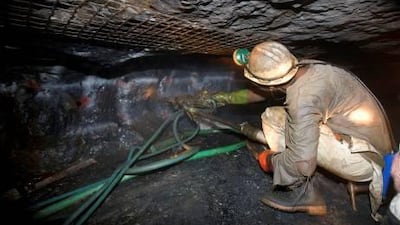South Africa's mining industry, vital to its economy, is concerned about rumblings from the powerful Youth League of the ANC to nationalise mines and farms
Africa has largely abandoned state ownership, once the economic model of despots and democrats alike.
Investment south of the Sahara is brisk as a result, making demands for nationalisation in South Africa all the more puzzling.
For the past year, the ruling African National Congress's (ANC) powerful Youth League has led demands for the nationalisation of mines and farmland to be placed on the party's to-do list. It is a call the country's rulers are finding increasingly hard to ignore.
The league's views carry weight in the organisation given its role as a kingmaker. Its support helped to oust Thabo Mbeki as the country's president a few years ago and replace him with Jacob Zuma.
"Comrades, we are not threatened … we will fight until we realise economic freedom in our lifetime," the league's president, Julius Malema, told supporters recently, calling mine owners robbers. "Political power without economic power is useless."
The country is a major producer of gold, coal and other minerals, and provides the world with most of its platinum. Mineral extraction contributes about 5.5 per cent of the country's GDP, according to government figures, and employs about 500,000 people.
Senior government leaders including Mr Zuma have repeatedly said nationalisation is not on the agenda. But these denials have sounded increasingly hollow, particularly as Mr
Zuma's popularity within the party wanes and he needs friends such as Mr Malema to back him up when the ANC has its next leadership contest in 2012.
Nationalisation was a central part of the ANC's rallying cry during its years as a liberation movement opposed to apartheid. It was discarded in the heady days of white rule, unravelling in the early 1990s after Nelson Mandela was released, and party leaders such as Mr Mbeki quietly allowed their Communist Party memberships to elapse.
Curiously, the league's efforts have been vigorously opposed by the South African Communist Party (SACP) and the trade unions, both of which are part of the ANC's ruling alliance. Neither of these two organisations has given up the notion of state control.
But Mr Malema is loathed by leaders of the unions and the SACP, whom he publicly insults at every opportunity.
There is also a feeling that Mr Malema's push for nationalisation is less about distributing wealth and more about rescuing cronies who borrowed heavily to invest in mines and are now in financial trouble. At least, that is what his critics are saying.
"We know that some of those people could not finance their agreements," Senzeni Zokwana, the president of the National Union of Mineworkers that represents about 300,000 workers, said recently. "So this may be a ploy to bail them out."
Whatever the motives behind Mr Malema's nationalisation drive, it has investors worried. In a country where nearly a third of the population is unemployed and many of the rest struggle to earn enough to meet basic needs, nationalisation has widespread appeal.
So even though nationalisation is not an official public policy debate, the heat being generated is worrying industry and sooner or later will affect investment.
Sipho Nkosi, the president of the industry representative body the Chamber of Mines, has welcomed official denials but says they are not enough. "We could never be 100 per cent comfortable simply because 'noises' keep on coming through from the [political] system," Mr Nkosi told Reuters.
Zambia, which led the drive to confiscate mines in the early 1970s, is only now beginning to recover from this economic disaster, analysts warn. Rupiah Banda, the president of Zambia, recently said it would not be tried again.
"We tried all that – nationalisation of mines or anything else – but just look at the carnage left behind. We failed," Mr Banda said.
business@thenational.ae

South African mining industry weary of nationalisation
The industry, vital to the country's economy, is concerned about rumblings from the powerful Youth League of the ANC's to nationalise mines and farms.
Most popular today
